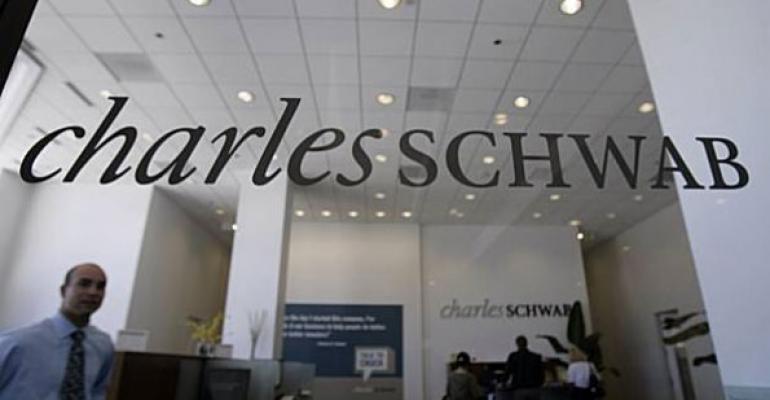A trio of Charles Schwab investment advisor subsidiaries will pay $187 million to settle charges with the Securities and Exchange Commission (SEC) that they misled clients about how their funds were allocated and that the process lowered profits for investors, while boosting cash for Schwab.
According to the SEC order, the three subsidiaries (including Charles Schwab & Co., Charles Schwab Investment Advisory and Schwab Wealth Investment Advisory) “made false and misleading statements” in disclosure documents about the cash component of the subsidiaries’ robo-advisor.
Gurbir S. Grewal, the SEC’s Enforcement Division Director, called Schwab’s conduct “egregious,” saying the settlement sent a message about advisors’ need for transparency about hidden fees.
“Schwab claimed the amount of cash in its robo-advisor portfolios was decided by sophisticated economic algorithms meant to optimize its clients’ returns when in reality it was decided by how much money the company wanted to make,” he said.
In March 2015, Schwab launched a robo-advisor called Schwab Intelligent Portfolios (SIP), with different subsidiaries serving as its sponsor and manager at different points. Unlike many robos, SIP didn’t charge clients an advisory fee, but instead profited largely by allocating a portion of clients’ portfolios to cash and depositing the cash with Schwab Bank, which would then pocket the spread it made when loaning the cash at higher interest rates. According to the commission, Schwab saw this as an advantage over other robos, as they did not have affiliated banks.
To offset the losses of not charging a fee, Schwab management mandated that SIP portfolios hold a certain amount of assets in cash, with Schwab Bank making back a minimum amount of revenue with pre-set cash levels. But Schwab’s internal models indicated that pre-setting cash allocations that way would lower the robo’s portfolio returns under certain market conditions, a situation referred to as a “cash drag.”
In one study, Schwab found that SIP portfolios would underperform a competitor’s portfolios at all risk levels, even if a hypothetical advisory fee was added, according to the commission. Another study showed clients’ returns would have been higher if the cash was invested with other low-risk assets, as opposed to with the affiliated bank.
“In other words, depositing the money with Schwab Bank rather than in other low-risk assets would, under market conditions where other assets such as equities outperform cash, lower investors’ returns by approximately the same amount as an advisory fee would have,” the order read.
But from 2015 through Nov. 2018, Schwab’s disclosure documents didn’t tell clients why they truly chose to allocate cash in this fashion, according to the order. On its Form ADV, the Schwab subsidiaries stated that the affiliated bank earned income from the cash allocations, but that those allocations were “set based on a disciplined portfolio construction methodology” tailored to clients’ goals and risk tolerance. This claim was false, according to the commission, because those cash allocations were pre-set by Schwab management.
While the disclosures noted that the cash allocation could affect a portfolio's risk profile and performance, Schwab’s internal studies found that the allocations would, in fact, lower clients’ returns, according to the SEC. Because of these and other issues in the subsidiaries' ADV filings, investors “were unable to make fully informed decisions,” according to the order. Schwab also touted in advertisements that there were no hidden or advisory fees in the robo, despite these cash allocations diminishing clients’ profits about as much as including an advisory fee would.
Starting in Nov. 2018, Schwab revised its Form ADV by removing the allegedly misleading statements and discontinued the advertisements.
In a statement about the settlement, Schwab noted that the SEC found Schwab “addressed these matters years ago” and called SIP a “key component” of its advisory lineup.
“We are proud to have built a product that allows investors to elect not to pay an advisory fee in return for allowing us to hold a portion of the proceeds in cash, and we do not hide the fact that our firm generates revenue for the services we provide,” the statement read. “We believe that cash is a key component of any sound investment strategy through different market cycles.”
Though it didn’t admit or deny the findings, Schwab’s subsidiaries agreed to pay $52 million in disgorgement and prejudgment interest, as well as a $135 million civil penalty. (The $187 million is particularly steep, according to XYPN co-founder Michael Kitces; on Twitter, Kitces estimated that it could be the equivalent of 100% of revenue on about $75 billion of a typical robo’s assets under management.)
Additionally, Schwab agreed to cooperate with ongoing investigations into the conduct detailed in the order and to retain a third-party consultant to review its policies and procedures concerning SIP’s disclosures, advertising and marketing. The Schwab subsidiaries also agreed to a censure and cease-and-desist as part of the order.




